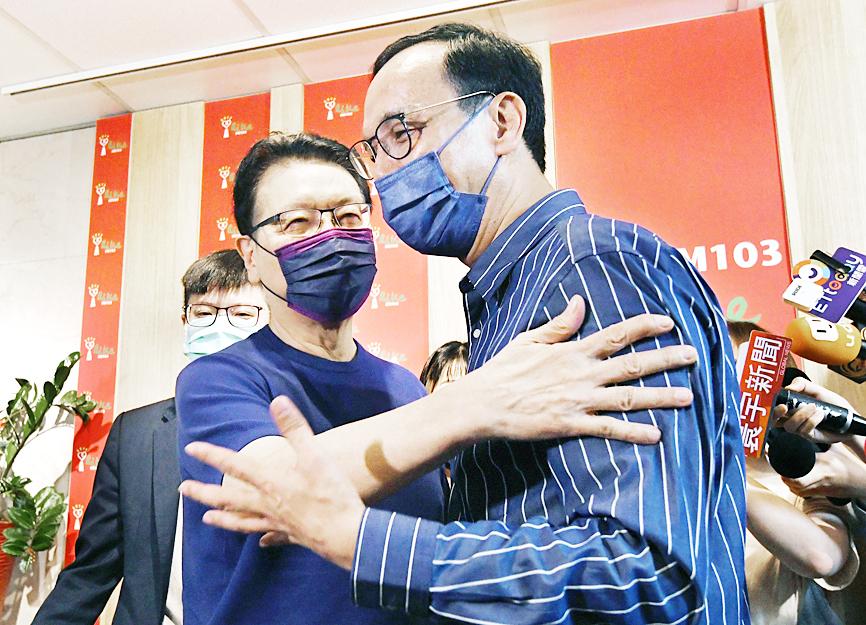The Chinese Nationalist Party (KMT) yesterday said that the US’ withdrawal from Afghanistan is proof that the party’s policy of remaining close to Washington while maintaining peace with China is correct.
The KMT made the remarks in a statement it issued in response to a news conference held earlier yesterday by the Democratic Progressive Party’s (DPP) legislative caucus, which accused KMT members of harming the nation’s diplomatic ties with their comments on the US troops’ withdrawal.
The statement referred to an article published by the New York Times on Friday last week, which cited analysts as suggesting that Washington’s hesitation to engage militarily abroad “will now be felt all the more strongly among countries in play in the world, like Taiwan, Ukraine, the Philippines and Indonesia.”

Photo: Liao Chen-huei, Taipei Times
“The sudden withdrawal from Afghanistan ... will see allies and potential allies around the world wondering whether they have to decide between democracies and autocracies, and realize some democracies don’t have staying power anymore,” the KMT quoted Tom Tugendhat, chairman of the British Parliament’s Foreign Affairs Committee, as saying in the article.
The US’ pullout proves that the KMT’s policy of being “close to the US” and pursuing “peace with the Mainland [China],” while improving Taiwan’s national defense and the economy, is correct, the KMT said.
It also shows that the DPP’s avoidance of the institutionalization of cross-strait relations is “by no means a good solution,” it added.
On national defense, the KMT accused the DPP of engaging in more talk than action, adding that this has disappointed figures in the US.
During former president Ma Ying-jeou’s (馬英九) time in office, “Taiwan never had to worry about how long it could last in a war against Mainland China, and whether the US would rush to the rescue,” the KMT said.
“Now, because of the changes in the political situation in Afghanistan, Taiwanese are reconsidering the various variables in national security,” the KMT said.

The manufacture of the remaining 28 M1A2T Abrams tanks Taiwan purchased from the US has recently been completed, and they are expected to be delivered within the next one to two months, a source said yesterday. The Ministry of National Defense is arranging cargo ships to transport the tanks to Taiwan as soon as possible, said the source, who is familiar with the matter. The estimated arrival time ranges from late this month to early next month, the source said. The 28 Abrams tanks make up the third and final batch of a total of 108 tanks, valued at about NT$40.5 billion

Two Taiwanese prosecutors were questioned by Chinese security personnel at their hotel during a trip to China’s Henan Province this month, the Mainland Affairs Council (MAC) said yesterday. The officers had personal information on the prosecutors, including “when they were assigned to their posts, their work locations and job titles,” MAC Deputy Minister and spokesman Liang Wen-chieh (梁文傑) said. On top of asking about their agencies and positions, the officers also questioned the prosecutors about the Cross-Strait Joint Crime-Fighting and Judicial Mutual Assistance Agreement, a pact that serves as the framework for Taiwan-China cooperation on combating crime and providing judicial assistance, Liang

A group from the Taiwanese Designers in Australia association yesterday represented Taiwan at the Midsumma Pride March in Melbourne. The march, held in the St. Kilda suburb, is the city’s largest LGBTQIA+ parade and the flagship event of the annual Midsumma Festival. It attracted more than 45,000 spectators who supported the 400 groups and 10,000 marchers that participated this year, the association said. Taiwanese Designers said they organized a team to march for Taiwan this year, joining politicians, government agencies, professionals and community organizations in showing support for LGBTQIA+ people and diverse communities. As the first country in Asia to legalize same-sex

MOTIVES QUESTIONED The PLA considers Xi’s policies toward Taiwan to be driven by personal considerations rather than military assessment, the Epoch Times reports Chinese President Xi Jinping’s (習近平) latest purge of the Chinese People’s Liberation Army (PLA) leadership might have been prompted by the military’s opposition to plans of invading Taiwan, the Epoch Times said. The Chinese military opposes waging war against Taiwan by a large consensus, putting it at odds with Xi’s vision, the Falun Gong-affiliated daily said in a report on Thursday, citing anonymous sources with insight into the PLA’s inner workings. The opposition is not the opinion of a few generals, but a widely shared view among the PLA cadre, the Epoch Times cited them as saying. “Chinese forces know full well that